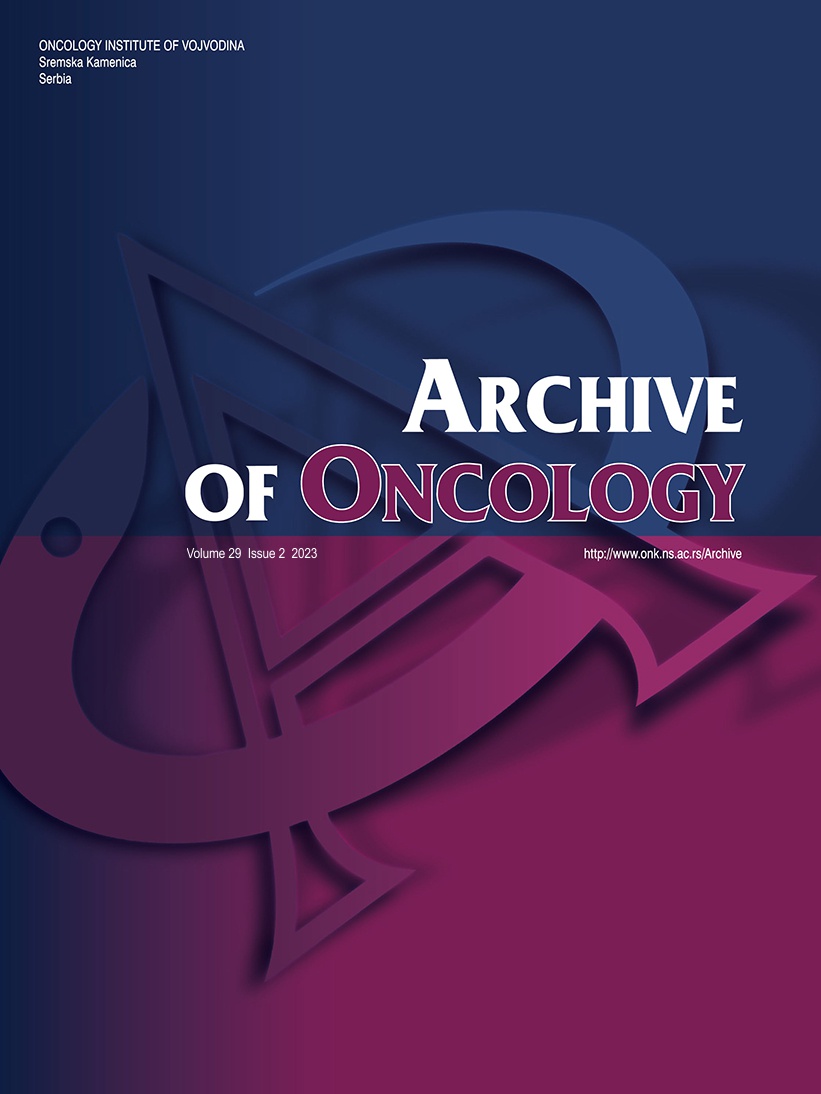The role of the nutritional status of geriatric patients with gastrointestinal cancer in developing postoperative complications
Abstract
Background: Many studies have shown that geriatric patients with altered nutritional status are at higher risk of developing complications during medical treatment. Our study aimed to examine the role of preoperative nutritional status in developing postoperative complications and the length of hospital stay in geriatric patients who suffer from cancer and undergo major abdominal surgery.
Methods: Prospective research was conducted at the Oncology Institute of Vojvodina from January 2020 until April 2021. This study included 82 patients over 65 years old, who were admitted to have radical surgery for gastrointestinal cancer performed. There were 6 patients excluded from the study. Nutritional status analysis was performed using BMI (Body mass index), preoperative serum albumin level, MNA-SF (Mini nutritional assessment- short form), and GNRI (Geriatric nutritional risk index). The classification of surgical complications was done using the Clavien-Dindo classification scale.
Results: Of the total number of patients, 57 of them (75%) developed at least one surgical complication. Nonsurgical complications have been recognized in 28 patients (36.84%). Overweight patients, according to BMI, had a greater chance of developing grade I (p < 0.01) and grade II (p < 0.05) surgical complications of the Clavien-Dindo classification. Patients with normal serum albumin levels had a significantly lower chance of developing surgical complications of any grade (p = 0.00). BMI and MNA- SF were the most important predictors of delirium. Patients without GNRI risk (GNRI: >98) had a significantly lower chance of developing nonsurgical complications regarding comorbidity exacerbation (p = 0.03), and delirium (p = 0.00).
Conclusion: None of the nutritional assessment tools used in our study were better or more efficient than the others in our sample of patients. Precise nutritional status assessment is complex and we cannot use only one scoring system or scale to get accurate results.
Keywords: nutritional status, diagnosis, malnutrition, geriatric
References
1. Ferlay J, Soerjomataram I, Dikshit R, Eser S, Mathers C, Rebelo M, et al. Cancer incidence and mortality worldwide: Sources, methods and major patterns in GLOBOCAN 2012. Int J Cancer. 2015;136: E359-E386. doi: 10.1002/ijc.29210.
2. Kagansky N, Berner Y, Koren-Morag N, Perelman L, Knobler H, Levy S. Poor nutritional habits are predictors of poor outcomes in very old hospitalized patients. Am J Clin Nutr. 2005;82:784–791. doi: 10.1093/ajcn/82.4.784.
3. Caccialanza R, Cereda E, Klersy C. Malnutrition, age and inhospital mortality. CMAJ. 2011 Apr 19;183(7):826. doi: 10.1503/cmaj.111-2038.
4. Fallon C, Bruce I, Eustace A, et al. Nutritional status of community-dwelling subjects attending a memory clinic. J Nutr Health Aging. 2002;6(Supp):21.
5. Arends J, Baracos V, Bertz H, et al. ESPEN expert group recommendations for action against cancer-related malnutrition. Clin Nutr 2017;36(5):1187–96.
6. Beirer, A. Malnutrition, and cancer, diagnosis and treatment. Memo 2021;14:168–173. https://doi.org/10.1007/s12254-020-00672-3.
7. Guigoz Y, Vellas B, Garry PJ. Assessing the nutritional status of the elderly: The Mini Nutritional Assessment as part of the geriatric evaluation. Nutr Rev. 1996 Jan;54(1 Pt 2):S59-65. DOI: 10.1111/j.1753-4887.1996.tb03793.x.
8. Guigoz Y, Lauque S, Vellas BJ. Identifying the elderly at risk for malnutrition. The Mini Nutritional Assessment. Clin Geriatr Med. 2002 Nov;18(4):737-57. DOI: 10.1016/s0749-0690(02)00059-9.
9. Vellas B, Guigoz Y, Garry PJ, Nourhashemi F, Bennahum D, Lauque S, Albarede JL. The Mini Nutritional Assessment (MNA) and its use in grading the nutritional state of elderly patients. Nutrition. 1999 Feb;15(2):116-22. DOI: 10.1016/s0899-9007(98)00171-3. PMID: 9990575.
10. Rubenstein LZ, Harker JO, Salvà A, Guigoz Y, Vellas B. Screening for Undernutrition in Geriatric Practice: Developing the Short-Form Mini-Nutritional Assessment (MNA-SF). J. Gerontol. 2001 Jun; 56(6):M366-M372. https://doi.org/10.1093/gerona/56.6.M366.
11. Salva A, Bolibar I, Munoz M, Sacritan V. Un nuevo instrumento para la valoracion nutricional en geriatria: el “Mini Nutritional Assessment” (MNA). Rev Gerontol 1996;6:319-328.
12. Borowiak E, Kostka T. Usefulness of short (MNA-SF) and full version of the Mini Nutritional Assessment (MNA) in examining the nutritional state of older persons. New Med. 2003;6:125-129.
13. Kinugasa Y, Kato M, Sugihara S, Hirai M, Yamada K, Yanagihara K, Yamamoto K. Geriatric nutritional risk index predicts functional dependency and mortality in patients with heart failure with preserved ejection fraction. Circ J. 2013;77(3):705-11. doi: 10.1253/circj.cj-12-1091.
14. Clavien PA, Barkun J, de Oliveira ML, Vauthey JN, Dindo D, Schulick RD, et al. The Clavien-Dindo classification of surgical complications: five-year experience. Ann Surg. 2009 Aug;250(2):187-96. DOI: 10.1097/SLA.0b013e3181b13ca2.
15. Gebauer B, Meyer F, Ptok H, Steinert R, Otto R, Lippert H, Gastinger I. Impact of Body Mass Index on Early Postoperative and Long-Term Outcome after Rectal Cancer Surgery. Visc Med. 2017 Oct;33(5):373-382. doi: 10.1159/000479852.
16. Akirov A, Masri-Iraqi H, Atamna A, Shimon I. Low Albumin Levels Are Associated with Mortality Risk in Hospitalized Patients. Am J Med. 2017 Dec;130(12):1465.e11-1465.e19. doi: 10.1016/j.amjmed.2017.07.020.
17. Vincent JL, Dubois MJ, Navickis RJ, Wilkes MM. Hypoalbuminemia in acute illness: is there a rationale for intervention? A meta-analysis of cohort studies and controlled trials. Ann Surg. 2003 Mar;237(3):319-34. DOI: 10.1097/01.SLA.0000055547.93484.87.
18. Soysal P, Veronese N, Arik F, Kalan U, Smith L, Isik AT. Mini Nutritional Assessment Scale-Short Form can be useful for frailty screening in older adults. Clin Interv Aging. 2019 Apr 17;14:693-699. doi: 10.2147/CIA.S196770.
19. Lilamand, M., Kelaiditi, E., Cesari, M. et al. Validation of the Mini Nutritional Assessment-Short Form in a population of frail elders without disability. Analysis of the Toulouse Frailty Platform population in 2013. J Nutr Health Aging. 2015;19:570–574 (2015). DOI: 10.1007/s12603-015-0457-4.
20. Zhao Y, Ge N, Xie D., et al. The geriatric nutrition risk index versus the mini-nutritional assessment short form in predicting postoperative delirium and hospital length of stay among older non-cardiac surgical patients: a prospective cohort study. BMC Geriatr. 2020;20:107. DOI: 10.1186/s12877-020-1501-8.
21. Kushiyama S, Sakurai K, Kubo N, Tamamori Y, Nishii T, Tachimori A, Inoue T, Maeda K. The Preoperative Geriatric Nutritional Risk Index Predicts Postoperative Complications in Elderly Patients with Gastric Cancer Undergoing Gastrectomy. In Vivo. 2018 Nov-Dec;32(6):1667-1672. doi: 10.21873/invivo.11430.

